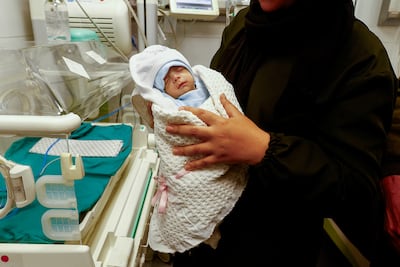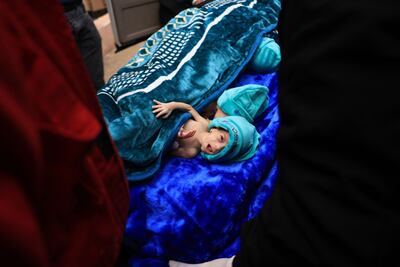Live updates: Follow the latest from Israel-Gaza
Premature babies evacuated from Gaza are fighting respiratory infections and malnutrition in Egyptian hospitals as their mothers remain in the besieged enclave, an official from the UN's Children's Fund has told The National.
Thirty-three infants were scheduled to be evacuated from Gaza's Al Shifa Hospital on Sunday. That number dropped to 31 with the death of two babies by the time a team co-ordinated by the UN arrived at the hospital. The team then undertook a perilous journey with the infants, who were wrapped in tin foil to keep them warm and driven several hours south without incubators, before reaching Rafah on the border with Egypt.
Twenty-nine babies have now been transferred to Egypt. Some of them are in a serious condition, having clung to life for the past six brutal weeks.
"It's heartbreaking to see these babies without the care that they should be getting," Unicef's Egypt representative Jeremy Hopkins told The National from Cairo.
"There are respiratory infections, malnutrition, and overall vulnerabilities which accompany premature babies," he said of their condition.
Eight babies, including a set of twins, have their mothers with them in Egypt, while the mother of another child is awaiting entry to Egypt at the Rafah border crossing.
"The children are split between Al Arish Hospital and Cairo. Some of those children are in particularly critical condition but others are more stable. They are getting the best possible care they can get."
The babies were born several weeks before or since the start of the most brutal war yet in Gaza, where more than 13,000 people have been killed. At least 6,000 people are said to be missing, presumed to be buried under the rubble of destroyed buildings.
Gaza's health ministry has published the names of the babies moved from Al Shifa.
One, who remains in Gaza's Emirati hospital - went unnamed, simply listed as arriving "after the bombing".
It is presumed the baby, who appeared in an October video from the health ministry, was the child rescued from his mother's womb as she succumbed to injuries sustained during an Israeli strike on her home.

Several mothers were able to briefly see their children at the Emirati Hospital in Rafah, where the babies were gently placed under thick blankets to stay warm while making their way to Egypt.
One woman was seen crying and warming her hands before caressing her baby, placed in an incubator with several other infants.
"I saw them for the first time today since I gave birth," Nour Al Bannah, mother of the twins, told the Associated Press.
"I did not expect to see them again," said Ayat Al Dour, from Gaza City.
"It was a difficult feeling, I felt fear coupled with joy. I missed them very much and wanted to hold them in my arms."

Unicef's family tracing teams in Gaza have undertaken taken painstaking work to track down parents and relatives of the babies left alone, some of whom are now orphans.
"It's an immediate cause for additional protection concerns. We need to ensure these babies are reunited with their families as soon as possible. That is an absolute right of every child," said Mr Hopkins, who said reunification efforts are "ongoing".
The representative praised the Egyptian health ministry for its work in assisting the babies, and says the UN continues to liaise with Cairo.
Doctors have said many parents have been unable to see their children since Israeli forces ordered civilians to evacuate south ahead of its raid on Al Shifa. Weeks later, all but nine of Gaza's hospitals are still operating - and there are more than 150 premature babies left in the enclave.
"The health system is under terrible pressure in Gaza, which has all but collapsed, but there are some healthcare and facilities functioning. There will be more babies born prematurely, there are babies born every day in Gaza, and possibly more are going to be born prematurely given the current situation," said Mr Hopkins.

Children of all ages have borne the brunt of the war in Gaza, with more than 5,600 killed in the enclave since October 7. Thousands more have been orphaned and wounded.
"The stories that I have heard have been horrific. Prior to this conflict, two thirds of children had some sort of mental health problem. Now we can safely assume that all children in Gaza have trauma and require psychosocial support," said Mr Hopkins.
"Some children are having nightmares, some children have stopped talking. Every day is a day lost for children."
"There are children who have been kidnapped that need to be returned. The killing in Gaza and across the region, in the West Bank, needs to stop. No child is going to be safe until we have an end to this."

